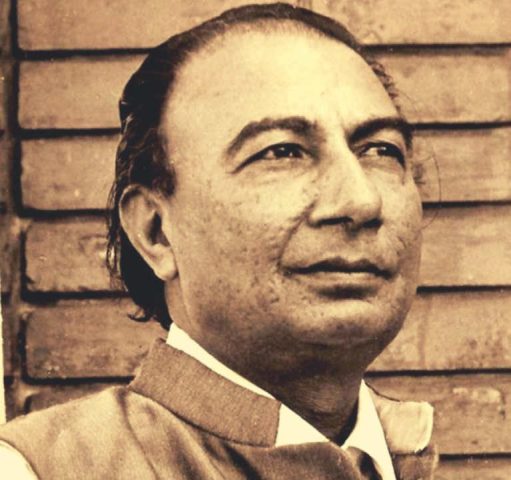
The Girl on the Train
March 12, 2021
Toofaan
March 12, 2021Sahir: Sufficient is the only blame of loving you..
There are many fans appreciating word treasure of Sahir. He penned painful and romantic songs with equal skills. He was a poet with social sensitivity who went on writing with his own sweet will. Though he had said I’m a poet of few moments (Mai Pal Do Pal Ka Shayar Hu), he is not a personality that can be forgotten easily. This is a short effort to express how he became favourite, touched heart, sometimes found not good when wondering in his memories. If you find anything great then it is due to Sahir and if you find any faults, I will be responsible for same.
When we recall Sahir Ludhiyanwi, his innumerable quality songs come across and start pouring honey in ears. He proved that very meaningful and emotionally sensitive songs can be popular in industry.
Duniyane Tajurbato Havadis ki Shakl me
Jo Kuchh Muze Diya hai, Wah Lauta Raha Hu
This is a Sher by Sahir which says that, through my lyrics I am just returning whatever I have received from the experiences of the world. This is immortal and complete truth as per his view and probably this is one of the reasons of his tremendous popularity. He enjoyed the popularity more than any other contemporary poet or lyricist only due to his words connecting with life. His writing had base of experience and also the flavor of facts.
In 1945 his poetry collection ‘Talkhiya’ was published and he became too much popular as a Shayar/ poet. He was also an editor of Urdu magazine Adab E Latib & Shahakara. After partition, he went to Pakistan but he felt suffocated there with lack of freedom of expression and writing freedom. His all fans were maximum Hindus. He used to work as editor of Savera at Lahor. When he started writing freely as per his nature, Pakistan government issued an arrest warrant against him and then Sahir had to leave Pakistan and he came to Delhi. Renowned poet Prakash Pandit was his close friend. He was working as editor of Shahrah and Preetladi. Along with being a poet, Sahir was editor also and so there was one more quality of journalist in him and that was waking up late in the morning and starting the day after 10. After rounds of tea and cigarettes he used to start work till late night. To reduce smoking, he used to cut it in two pieces but had a habit to finish both of them one after another. He always wanted someone to talk with him. Such company might include one person or four five, he used to go on talking continuously. This company always enjoyed the creations of Sahir and also by others through him. Sahir had a nature’s gift of sharp memory. He would reproduce all the dialogues of movies Indrasabha and Shahbahram watched in his childhood. He had much proud of his writing skills and creativity. His poetry collection Talkhiya was published in Urdu with twenty one editions and in Hindi with eleven editions. This shows how popular was he among readers and fans.
Poets, lyricists are always moody and Sahir was not an exception to this rule. He used to get angry over small things. It was his nature to get frightened, to target close friends when angry and his loved ones were very well aware about all this. When he was to attend any Mushayara (Poetic recitals program) he used to become uneasy as he could not decide as to which of his poems or lyrics or gazal should be presented there.
Sahir remained unmarried all the life, probably he would not have been able to take the decision of marriage. That ‘She’ peeping from his poetry must be his failure in love. He was of so good character to say ‘Chalo Ik Baar Phir Se Ajnabi Ban Jaaye Ham Dono’ (let’s be unknown to each other once again) Why so? Why his personality was of this nature? If we try to search the reasons behind this, we come across the bitter incidents he had to face in his life, which made him so. Sahir’s original name was Abdul Hai. He was born in 1921 in the house of a landlord. The landlord father had eleven wives in addition to Sahir’s mother. But he was treated well as he was the only son. Fed up with luxurious pleasure loving approach of Sahir’s father, his mother left home. When the matter of separation was in court, Sahir told there that he wants to live with his mother. His father got angry with his decision. He threatened to kill him or snatch him from his mother. His mother appointed some persons for his safety. This hatred created fear in his mind. Sahir had many bitter experiences in his life. He did many kinds of work to meet the ends and bread butter. This struggle of brain and heart made him Sahir and all the storms in mind came out as Talkhiya. When Sahir became poet, at that time Firaq, Faiz and Majaj were on the top of popularity. When any artist is in his budding stage, he gets influenced by the contemporary successful ones in his field. Sahir was also not an exception to this. His writing was influenced by Faiz and Majaj, but the experiences in his life had made his pen so powerful with uniqueness in his creativity which can be seen from his following lines.
Mai Un Ajdaar Ka Beta Hu Jinhone Paiham
Ajnabi kaum Ke Saaye Ki Himayat Ki Hai
Gadr Ki Saate Napaak Se Lekar Abtak
Har Kade Waqt Me Sarkar Ki Khidma Ki Hai
Na Koi Jyada Na Manjil
Na Roshani Na Surag
Bhatak Rahi Hai Khalaao Me Jindagi meri
Inhi Khalao Me Rah Jaaunga Kabhi Kho Kar
Mai Jaanata Hu Meri Ham Nafas Magar Yunhi
Kabhi Kabhi Mere Dil Me Khayal Aata Hai
Ki Jindagi Teri Julfo Ki Narm Chhao Me
Gujarane Paati To Shadab Ho Bhi Sakati Thi
Yah Tiragi Jo Meri Jism Ka Mukaddar Hai
Teri Nazar KI Duawo Me Kho Bhi Sakti Thi
Due to the wordings Kabhi Kabhi, some may remind that movie; but this is given here with some different intention. Sahir’s words gained weightage because he described his life experiences very genuinely. Without any ornamental language he simply described the feelings and those captured the hearts of readers.
Sahir is a romantic poet. Due to failure in love, he was so upset that he questioned her as
Mere Khwabon Ke Zarokhon Ko Sajanewali
Tere Khwabon Me Kahi Mera Gujar Hai KI Nahi
Puchh Kar Apani Nigaho Se Bata De Muzko
Meri Raato Ke Mukaddar Me Sahar hai Ki Nahi
There are two images of Sahir, Poet and Lyricist. As a lyricist he came closer to general public and became an apple of elite fans’ eyes. When searched in memories while reading his ‘Meri Mehboob Kahi Aur Mila Kar Muze’ I realized that it had become a part of his emotional life. His poem on Tajmahal though sarcastic, is very nice. His emotions of love did not energize while in the closeness of the Taj Mahal, the image of love. Just like if he did not want the place to meet his lover. So he wrote …
Yah Chaman Jaar,
Yah Jamna Ka Kinara Yah Mahal
Yah Munakkas Daro – Diwar Yah Mehraab, Yah Taak.
Ik Shahanshah Ne Daulat Ka Sahara Le Kar
Ham Garibo Ki Muhabbat Ka Udaaya Hai Mazaak.
Meri Meboob Kahi Aur Milaa Kar Muze
It was a great shock by Sahir given to all the romantic images and assumptions about Taj Mahal. His questions just hit the hearts as the workers who built Taj Mahal would have also loved someone, then where is their memorial? Who will light a lamp on their tombs?
See this
Mere Mehboob! Unhe Bhi To
Mohabbat Hogi,
Jinaki Sannaine bakhshi Hai
Isi Shakl E Jamil.
Unake Pyaro Ke Maqabir Rahe Be Naamo Namood,
Aaj Unape Jalaai Na Kisi Ne Kandil
Sahir was really an amazing poet. His one more creation shows how he was so different. When lovers meet, all emotions get booster and it’s but natural, but he is very different here too!
Chand Kaliya Nishaat Ki Chun Kar
Muddato Mahar E Yaas Rehta Hu
Tera Milna Khushi Ki Baat Sahi
Tuzse Milkar Udaas Rehata Hu
While writing this, Sahir firmly told in movie Baazi in the voice of Geeta Dutt as ‘Apane Pe Bharosa Hai To Ek Daanv Laga Le’. Under heading Fankaar he says ‘maine Jo Geet Tere Pyar Ki Khatir Likhe, Aaj Un Geeton Ko Bazar Me Le Aaya Hun’
Sahir won the Baazi (Race) of being lyricist by writing for Baazi movie with music by Sachin Deo Burman and then next twelve years he just conquered the field and continued creating storms in the emotional world of appreciators. In those days the optimism of Sahir was closed to the then youth. It was wondered that how this man was able to appropriately catch the emotions in our minds. In movie Sone Ki Chidiya he expresses hopes as Raat Bhar Mehaman Andhera, Kiske Roke Ruka Hai Savera and further says, Phir Subah Hogi.
Jis Subah Ki Khaatir Jug Jug Se Ham Bharbharkar Hai
Jis Subah Ke Amrit Ki Dhun Me Ham
Zahar Ke Pyale Pite Hai
In Bhukhi Pyasi Ruhon Par Ik Din To
Karam Farmapuj
Wah Subah Kabhi To Aayegi
After Baazi there came Jaal (Trap) of Dev Anand and viewers got themselves trapped in it. The music lovers felt the song ‘Yah Raat Yah Chandani Phir Kaha, Sun Ja Dil Ki Dastan’ very close to them.
Pedo Ki Shakho Pe Soi Soi Chandani
Tere Khayalo Me Khoi Chandani
Aur Thodi Der Me Thak Ke Laut Jayegi
Raat Yah Bahaar Ki Phir Kabhi Na Aayegi
Do Chaar Pal Aur Hai Yah Samaan
Sun Jaa Dil Ki Dastaan
When Sahir describes moonlight with such beautiful words so sensitively, I feel like saluting him for this. The song the voice of Lata Ji from Jaal itslf saying, ‘Pighala Hai Sona Door Gagan Par, Fail Rahe Hai Shaam Ke Saaye’, also goes in the same group. This is the real gold in the forms of words. Sahir used to describe the nature same like as any painter creates a landscape on canvas by strokes of his brush. Parvat Ke Pedo Par Shaam Ka Basera Hai….. Surmai Ujaala Hai, Champai Andhera Hai, is just amazing.
Poem was in his blood. While describing pains of women he writes to criticize as, ‘Aurat Ne Janam Diya Mardo Ko, Mardo Ne Usey Bazar me Diya Hai’.
And the most favourite in those days was, the sad emotional song Jaaye To Jaaye Kaha, Samazega Kaun Yaha, from Taxi Driver. Lyricist Sahir, voice by Talat and music by Sachin Da, Prince of Tripura, then the song will create history, is a simple easy guess without help of any astrologer. Even after decades this song is still appreciated.
Thandi Havaaye by Lata Ji in Naujwan, Tu Na Jaane Kis Jahaan Me Kho Gaye, Jise Tu Kabool Kar Le Wah Tohfa Kaha Mai Laau or Jivan Ke Safar Me Raahi Milate Hai Bichhad Jaane Ko by Kishor Kumar from Munimji, so many songs are there and the work by pair of Sahir and Sachin Da in Pyasa is the best.
When Gurudatt sings the gazal in Pyasa
‘Tang Aa Chuke Kashmakash Jindagi Se Ham
Thukara Na De Jahaan Ko Kahi Bedili Se Ham’
It just brings goose bumps
His questions like Jaane Wah Kaise Log The Jinake Pyar Ko Pyar Mila, Jinhe Naaz Hai Hind Par Wah Kaha Hai make us think.
‘Jalaa Do Ise, Phoonk Dalo Yah Duniya
Mere Saamane Se Hata Lo Yah Duniaya
Tumhari Hai Tum Hi Samaz Lo Yah Duniya
Yah Duniya Agar Mil Bhi Jaaye To Kya Hai’
‘Pyasa was a story of a poet, his life story. Perusing all the songs in it, one can think that whether this Vijay is Sahir himself or what? It is felt that Sahir has poured all his life experiences in that character. It is to be noted here that for perfectly describing the emotions of Vijay and the social situation around, Gurudatt had correctly selected Sahir.
One more music director giving perfect justice to the words of Sahir is Roshan. Barsaat ki Raat became so nice due to beauty of Madhubala and also by lyrics by Sahir. After kawwali, ‘Aahe Bhari Na Shikawe Kiye’ in Zeenat, the youth had just gone mad after listening the kawwali, ‘Naa To Kaarwaan Ki Talaash Hai’ from Barsaat Ki Raat. The rhythm of Yah Ishq Ishq Hai Ishq made them amazed. No other than Sahir was able to describe Madhubala’s beauty when wet in rainy night. His words feel like eyes and not words.
Darr Ke Bijali Se Achanak
Wah Lipatana Usaka
Aur Phir Sharm Se Balkhake Simatana Usaka
Jindagi Bhar Nahi Bhulengee
Wah Barsaat Ki Raat
Magical words of Sahil, voice of Rafi and Madhubala in wet clothes on screen is dream come true event. This is the heavenly co- incidence. The combination of beautiful words with the real beauty on screen could never be experienced again. That’s why Barsaat Ki Raat brings goose bumps to film lovers in every season. It must be accepted that expressionless Bharat Bhushan could be bearable only due to Madhubala. For Taj Mahal Sahir expresses his different views but while writing fo Taj Mahal movie he writes, Jo Vaada Kiya Wah Nibhaana Padega. Sahil uses his Urdu vocabulary treasure while writing Tum Ekbaar Muhabbat Ka Imtehaan To Le Lo in Baabar or Ham Intajaar Karenge Qayamat Tak in Bahubegum. However, the same Sahir skillfully writes Sansar Se Bhaage Phirate Ho, Bhagwaan Ko Tum Kya Paaoge and Man Re Tu Kaahe Na Dheer Dhare for Chitralekha in pure Hindi also.
His song, Maine Chand Aur Sitaaron Ki Tamanna Ki Thi, Muzko Raaton Ki Siyahi Ke Siva Kuchh Na Mila from Chandrakanta was a college days’ favourite song. While listening his Saathi Haath Badhaana or Maang Ke Saath Tumhaara Maine Maang Liya Sansaar still brings the sound of horse running in ears. His some more golden songs are Aaana Hai To Aa, Reshami Salwaar Kurta Jaali Ka, Roop Saha Nahi Jaaye Nakharewaali Ka inviting the young age feelings and his ‘Tu Hindu Banega Na Musalman Banega, Insaan Ki Aulad Hai Insaan Banega’ from Dhool Ka Phool underlines his progressive thoughts.
Memories are much more and are making more emotional while recalling. Decades ago Sahir left this world on 25th October 1980 but for his fans he is immortal in his words, poems, lyrics. He has created his own place in literature. He has put his life book before us and that will accompany us in every emotional up and down.
-
adminhttps://navrangruperi.in/author/admin/
-
adminhttps://navrangruperi.in/author/admin/
-
adminhttps://navrangruperi.in/author/admin/
-
adminhttps://navrangruperi.in/author/admin/




